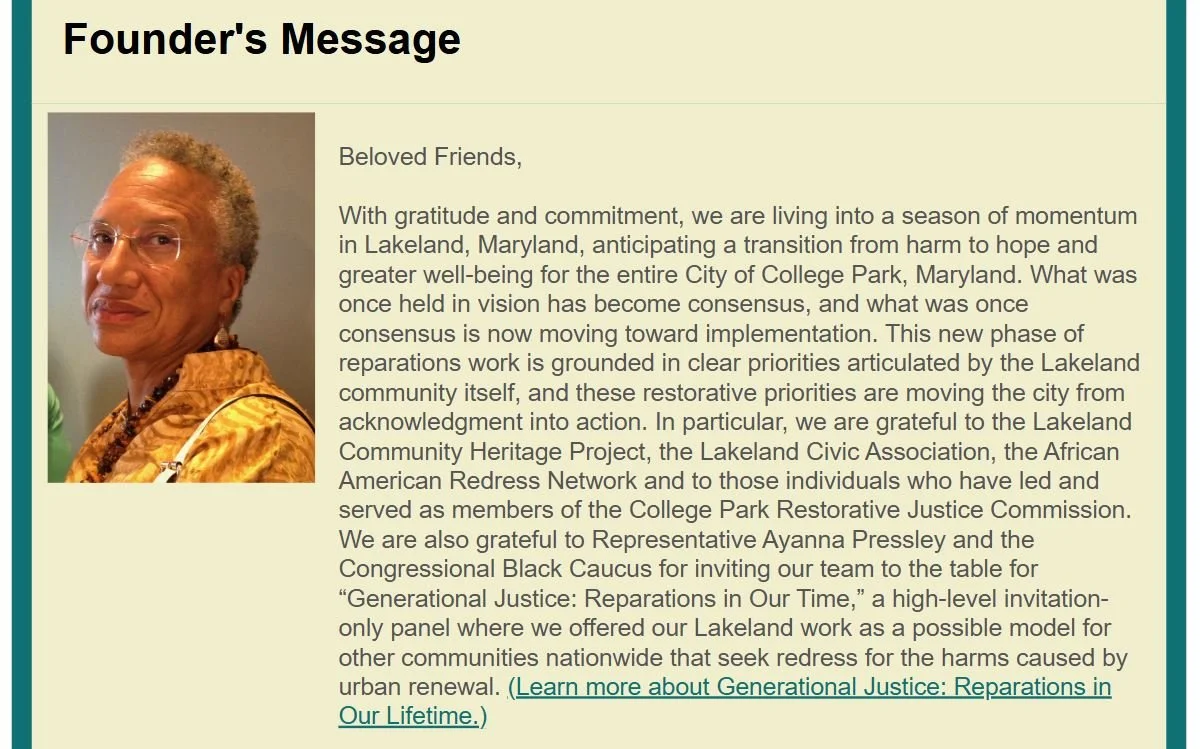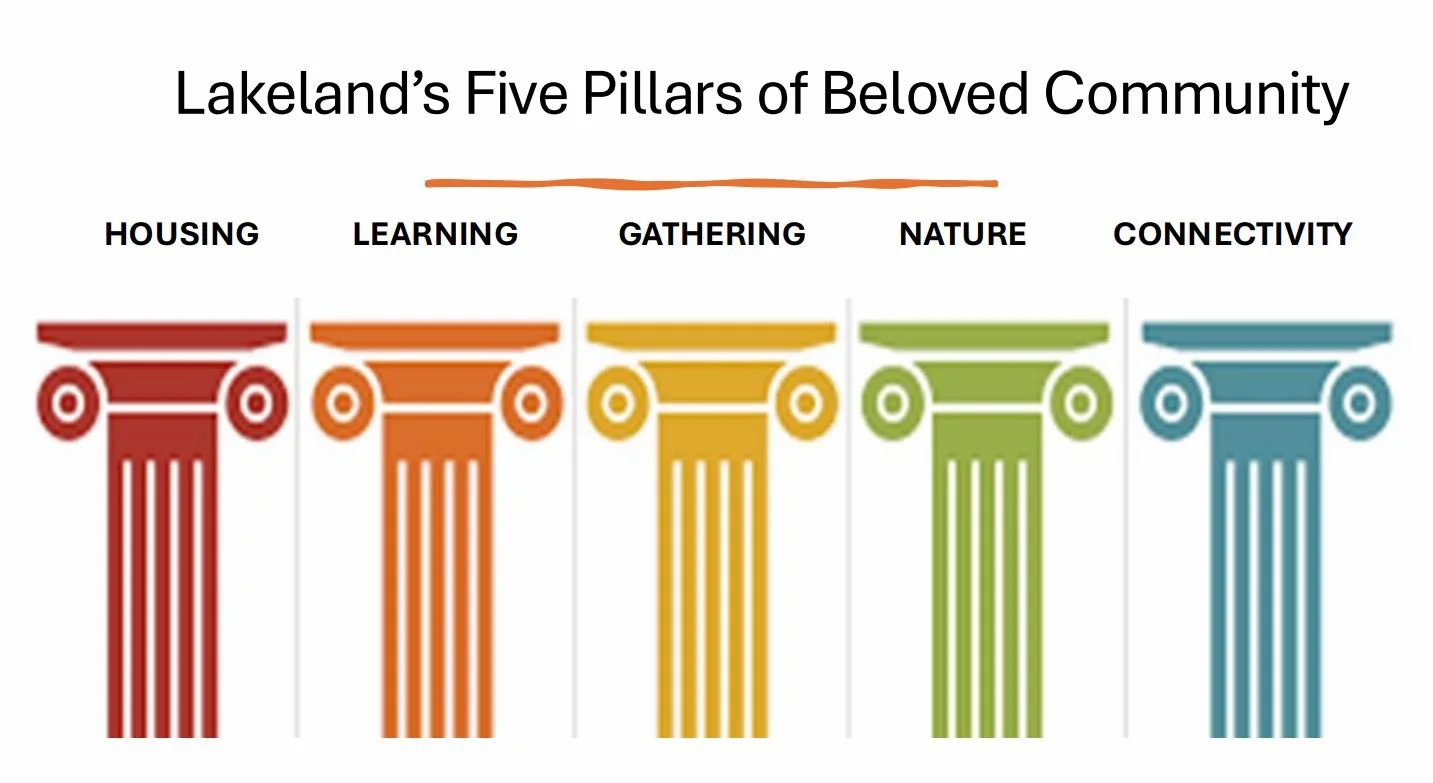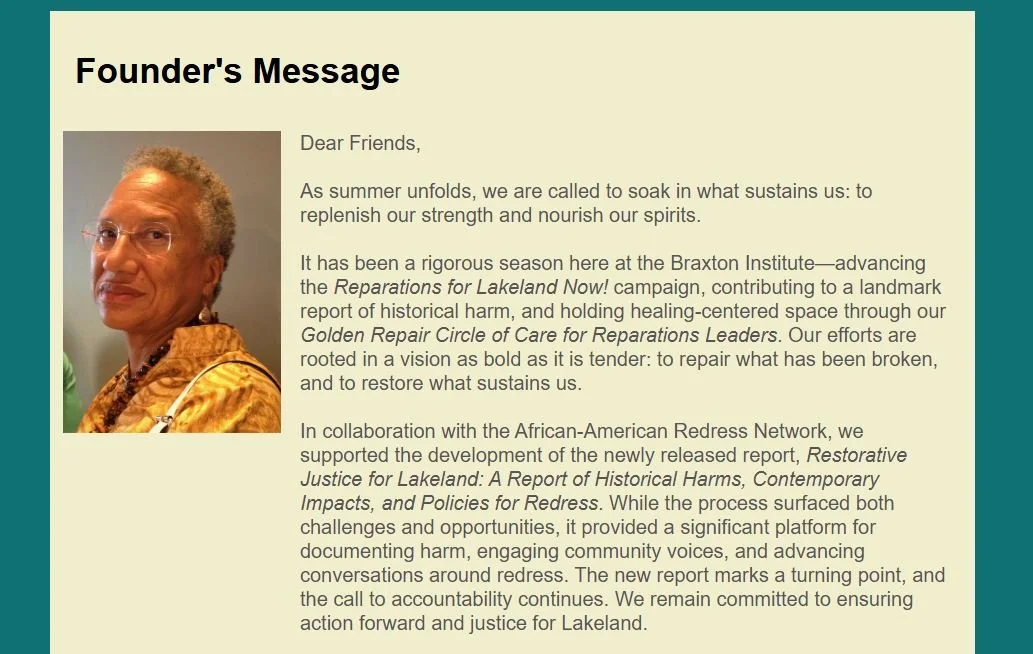On Tuesday October 7, 2025 the Braxton Institute pulled together a remarkable group of local, regional, and national reparations leaders to witness a historic presentation by the College Park Restorative Justice Commission to the College Park, Maryland City Council. “The Way Forward Towards Restorative Justice in College Park” is a comprehensive range of initiatives that, when carried out, will make good the City’s promise for repair.
With gratitude and commitment, we are living into a season of momentum in Lakeland, Maryland, anticipating a transition from harm to hope and greater well-being for the entire City of College Park, Maryland. What was once held in vision has become consensus, and what was once consensus is now moving toward implementation. This new phase of reparations work is grounded in clear priorities articulated by the Lakeland community itself, and these restorative priorities are moving the city from acknowledgment into action.
From the archives of the Lakeland Community Heritage Project and the testimony of Lakelanders, members of a historic African American town in Maryland adjacent to Washington, DC, five recurring themes emerge. These themes describe the strength and vitality of Lakeland before “urban renewal.” Social psychiatrist Mindy Fullilove, M.D., observed that these “Five Pillars” represent all of the necessary components for a healthy urban habitat.
I stand in the light of who I am now and who I am becoming,
a witness to the mending of what is and what was broken,
I am a keeper of the pieces I have gathered,
I am a child of those who walked before me whose shoulders upon which I stand…
Blair Bowie is a voting rights attorney at the Campaign Legal Center (CLC) who is determined to restore voting rights for incarcerated Americans. Bowie works with Restore Your Vote, a program striving to abolish the last remaining Jim Crow law: the disenfranchisement of people with felony convictions.
It has been a rigorous season here at the Braxton Institute—advancing the Reparations for Lakeland Now! campaign, contributing to a landmark report of historical harm, and holding healing-centered space through our Golden Repair Circle of Care for Reparations Leaders. Our efforts are rooted in a vision as bold as it is tender: to repair what has been broken, and to restore what sustains us.
The release of Restorative Justice for Lakeland: A Report of Historical Harms, Contemporary Impacts, and Policies for Redress marks a milestone in a long and ongoing struggle. It also marks something more: an affirmation of presence, memory, and power. It is now impossible to erase Lakeland from its history—or from its future.
In the wake of Governor Moore’s veto of statewide reparations commission legislation—and his affirmation of the urgency of addressing structural racial harm through tangible action—we offer these proposals as opportunities for meaningful action now.
I was deeply honored to attend the fourth session of the United Nations Permanent Forum on People of African Descent (PFPAD) in New York City, from April 14-17, 2025. For weeks leading up to this convening, there had been online side events. Many of these events focused on the intersection of health and healing and addressing the violence against Black women and girls around the world… These preparatory programs updated participants like me with the latest knowledge about conditions impacting people of African descent globally… This was my first Permanent Forum on People of African Descent, and I was approaching it with my “beginner’s mind,” the student with everything to learn.
As the fullness of spring blossoms— bringing beauty even in these challenging times— I find myself reflecting on the persistent progress of our work here at the Braxton Institute. I think of its richness, its fervor, and its steady emergence from the shadows of history into the transformative light of repair.
For those who observe the Christian traditions of Holy Week, Good Friday invites remembrance of Jesus’ crucifixion. Some Christians mark the day with rituals contemplating the Stations of the Cross or Jesus’ seven last words; grateful devotions to honor his suffering and death as a saving sacrifice that forgives human sin. But not all Christians approach Good Friday this way. For others, such as myself and many like me, Good Friday is a day to grieve the historical reality that the Roman Empire publicly executed Jesus to terrorize his disciples and to quell uprisings of Jewish resistance.
On April 4-5, 2025, Dr. Joanne Braxton, President of the Braxton Institute, was honored to join a distinguished panel of experts at the Maryland Lynching Truth and Reconciliation Commission’s historic public hearing on the enduring legacy of racial terror lynchings.
Like the majority of black women in America, I waited on the most recent presidential election results with bated breath, hoping against hope that this country was progressive enough to choose a woman of color to lead it. Exhausted by nearly a decade of divisive, hate-filled political rhetoric, I desperately wanted to turn the page on this disheartening chapter and finally feel like we were moving forward.
In honor of Black History Month, we reflect on the power of remembrance— both as a means of honoring and also as a force for justice.
The Braxton Institute continues to lead the conversation on reparative justice and community restoration, as highlighted in a recent NBC4 special. The segment featured Dr. Joanne Braxton, founder and President of the Braxton Institute, alongside Maxine Gross, College Park Reparative Justice Commission Chair and Braxton Institute’s Reparations for Lakeland Now! initiative.
Today was a long but good day. I had the honor of giving testimony before the Maryland Senate Committee on Education, Energy, and Environment on MD SB469 – the Harriet Tubman Community Investment Act (Maryland Reparations Study for Black Descendants of Enslaved Individuals). We were required to submit our testimony in advance, and I thought I was being slick by submitting mine as “written testimony” instead of “oral and written testimony'“; My plan was to have my testimony on the record and then sit back and watch the activities unfold.
On Thursday February 20th, 2025, Senator Joanne Benson along with a panel of witnesses introduced the Harriet Tubman Community Investment Act to the Education Environment and Energy subcommittee in the senate of the Maryland General Assembly. This subcommittee determines whether the bill will move on to the joint committee for voting.
At what is yet still the beginning of a new year, I greet you with Joy and Hope, in the name of all that is Holy.
As we enter Advent, a season which in the Christian calendar marks a time of preparation and renewal, we also approach winter solstice, the longest night of the year.
Reparations and Peacebuilding: two words that seem unrelated. Many think Reparations only relates to things that happened “back then.” And that peacebuilding only relates to things happening “over there.” But both are a significant part of building healthy and just societies. And if we bring them together, we can see they are deeply interrelated. Peacebuilding offers a few frames to help us further explore the work of Reparations.
I am a nonbinary trans man living in Washington, D.C. This August, I decided to change my legal name and gender marker to match the name and gender I live as. While I’d like to say that this is a warm-hearted end to a journey of self-discovery, the truth is a bit more pragmatic. Historically, I hadn’t felt the need to update my legal documents because I felt secure and comfortable using my chosen name and gender identity without matching legal identification. Ultimately, the main reason I decided to change my legal documents is because I want to keep myself safe.
Make no mistake about it, the work of repair is difficult and exhausting. Most of us repairers come to the work from a place of our own injury, or from our awareness of having seen systemic harm and injury and been unable to prevent it.
I know what it is to feel
Your world turned on its axis
Up feels down
Words come at you garbled,
As if fighting their way through deep dark waters
Sound is muted
Light is dimmed
Your heart is numb
Your skin is on fire
It has been an incredibly rich time for the Braxton Institute as we live fully into our purpose: “to co-create collective strategies to repair and heal harms and traumas of historically oppressed communities and to lift up legacies of resistance and joy.”
When I heard the news, I was at the airport in Salt Lake City, on my way to a retreat in Tulsa for 50 regional reparations leaders. On that day, June 12, 2024, the Oklahoma Supreme Court dismissed a reparations lawsuit by the last two survivors of the 1921 Tulsa race massacre, Viola Ford Fletcher, 109, and Lessie Benningfield Randle, 108. When I arrived in Tulsa, it was an impressive 100 degrees just an hour before midnight.
Did you know it was once the custom of many African American communities to celebrate Independence Day on the 5th of July?
Let us ask our ancestors — all who have made this road by walking before us — to be here, today & always. As Chrystos* reminds us — we walk in the history of our people. Those of our blood & those of our belonging. Some whose names we know & many whose names only whisper in the mysteries. We invite all who have served us with their experience, wisdom, strength & their longing. We are their wildest dreams & we are grateful for their conjuring.
An important lesson I've learned is to trust the Universe at life's crossroads. This advice is common but hard to follow! Over the years, I realized listening to my deepest intuition often goes against my desire for certainty. Taking big, potentially life-changing risks can feel nearly impossible. Yet, every transformation in my life happened when I got out of my own way. I've been reminded again and again that valuing my inner-knowing, which connects me to greater forces, will always guide me where I need to go.































On Saturday, November 22, 2025, I had the honor of representing the Braxton Institute at A Day of Acknowledgement: Confronting the Legacy of Slavery, held at Maryland Hall in Annapolis. The program centered on a historic moment: County Executive Steuart Pittman’s formal apology for the profound and enduring impacts of slavery on generations of Black Americans.